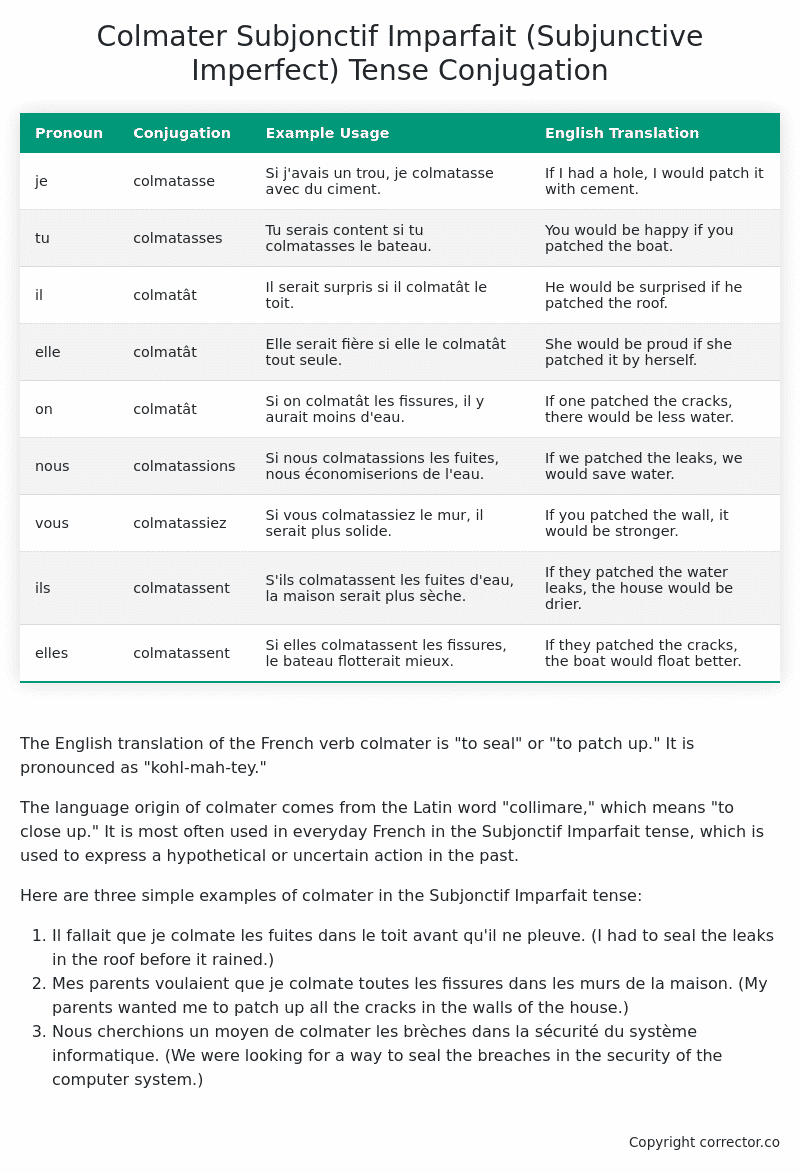Subjonctif Imparfait (Subjunctive Imperfect) Tense Conjugation of the French Verb colmater
Introduction to the verb colmater
The English translation of the French verb colmater is “to seal” or “to patch up.” It is pronounced as “kohl-mah-tey.”
The language origin of colmater comes from the Latin word “collimare,” which means “to close up.” It is most often used in everyday French in the Subjonctif Imparfait tense, which is used to express a hypothetical or uncertain action in the past.
Here are three simple examples of colmater in the Subjonctif Imparfait tense:
- Il fallait que je colmate les fuites dans le toit avant qu’il ne pleuve. (I had to seal the leaks in the roof before it rained.)
- Mes parents voulaient que je colmate toutes les fissures dans les murs de la maison. (My parents wanted me to patch up all the cracks in the walls of the house.)
- Nous cherchions un moyen de colmater les brèches dans la sécurité du système informatique. (We were looking for a way to seal the breaches in the security of the computer system.)
Table of the Subjonctif Imparfait (Subjunctive Imperfect) Tense Conjugation of colmater
| Pronoun | Conjugation | Example Usage | English Translation |
|---|---|---|---|
| je | colmatasse | Si j’avais un trou, je colmatasse avec du ciment. | If I had a hole, I would patch it with cement. |
| tu | colmatasses | Tu serais content si tu colmatasses le bateau. | You would be happy if you patched the boat. |
| il | colmatât | Il serait surpris si il colmatât le toit. | He would be surprised if he patched the roof. |
| elle | colmatât | Elle serait fière si elle le colmatât tout seule. | She would be proud if she patched it by herself. |
| on | colmatât | Si on colmatât les fissures, il y aurait moins d’eau. | If one patched the cracks, there would be less water. |
| nous | colmatassions | Si nous colmatassions les fuites, nous économiserions de l’eau. | If we patched the leaks, we would save water. |
| vous | colmatassiez | Si vous colmatassiez le mur, il serait plus solide. | If you patched the wall, it would be stronger. |
| ils | colmatassent | S’ils colmatassent les fuites d’eau, la maison serait plus sèche. | If they patched the water leaks, the house would be drier. |
| elles | colmatassent | Si elles colmatassent les fissures, le bateau flotterait mieux. | If they patched the cracks, the boat would float better. |
Other Conjugations for Colmater.
Le Present (Present Tense) Conjugation of the French Verb colmater
Imparfait (Imperfect) Tense Conjugation of the French Verb colmater
Passé Simple (Simple Past) Tense Conjugation of the French Verb colmater
Passé Composé (Present Perfect) Tense Conjugation of the French Verb colmater
Futur Simple (Simple Future) Tense Conjugation of the French Verb colmater
Futur Proche (Near Future) Tense Conjugation of the French Verb colmater
Plus-que-parfait (Pluperfect) Tense Conjugation of the French Verb colmater
Passé Antérieur (Past Anterior) Tense Conjugation of the French Verb colmater
Futur Antérieur (Future Anterior) Tense Conjugation of the French Verb colmater
Subjonctif Présent (Subjunctive Present) Tense Conjugation of the French Verb colmater
Subjonctif Passé (Subjunctive Past) Tense Conjugation of the French Verb colmater
Subjonctif Imparfait (Subjunctive Imperfect) Tense Conjugation of the French Verb colmater (this article)
Subjonctif Plus-que-parfait (Subjunctive Pluperfect) Tense Conjugation of the French Verb colmater
Conditionnel Présent (Conditional Present) Tense Conjugation of the French Verb colmater
Conditionnel Passé (Conditional Past) Tense Conjugation of the French Verb colmater
L’impératif Présent (Imperative Present) Tense Conjugation of the French Verb colmater
L’infinitif Présent (Infinitive Present) Tense Conjugation of the French Verb colmater
Struggling with French verbs or the language in general? Why not use our free French Grammar Checker – no registration required!
Get a FREE Download Study Sheet of this Conjugation 🔥
Simply right click the image below, click “save image” and get your free reference for the colmater Subjonctif Imparfait tense conjugation!

Colmater – About the French Subjonctif Imparfait (Subjunctive Imperfect) Tense
Formation
Common Everyday Usage Patterns
Interactions with Other Tenses
Subjonctif Présent
Indicatif Passé Composé
Conditional
Conditional Perfect
Summary
I hope you enjoyed this article on the verb colmater. Still in a learning mood? Check out another TOTALLY random French verb conjugation!


